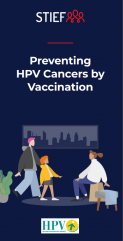HPV vaccine
Also called human papilloma virus vaccine
Key points about HPV vaccine
- The HPV vaccine protects against a virus that causes several cancers that can affect anyone.
- HPV vaccine is also called Gardasil.
- Find out about the vaccine and possible side effects.

HPV vaccine helps protect against a virus that causes several cancers that can affect anyone. These include cancers of the cervix, vulva, vagina and anus in women, or cancers of the anus and penis in men, and possibly throat cancers for both men and women. The vaccine is also effective at preventing genital warts.
- The vaccine works by causing your body’s immune system to produce its own protection (antibodies) against the HPV types most likely to cause cancer or genital warts.
- If an immunised person comes into contact with HPV, the antibodies in their blood will fight the virus and protect them against being infected.
- It usually takes several weeks after vaccination to develop protection against HPV.
Protection from the vaccine is long-lasting and is not expected to wear off over time.
In New Zealand, the HPV vaccine is available free for everyone aged 9–26 years.
- It is recommended to be given to children aged 11–12 years.
- For children aged 9–14 years, the HPV vaccine is given as 2 doses, at least 5 months apart. This age group develops a stronger immune response than those vaccinated when they are older.
- People aged 15 years and older will need 3 doses of the vaccine, spaced over 6 months.
- Each dose is given as an injection into the muscle of your arm or leg.
Children are offered the vaccine at most schools, usually in Year 7 or 8.
(Te Whatu Ora, NZ, 2023)
People aged 27 years or older may still benefit from receiving a course of 3 HPV vaccine doses. If you have not started the course by age 27, you need to buy the vaccine doses through your family doctor or Sexual Wellbeing Aotearoa Clinic.
The HPV vaccine is recommended in people aged 27 years and older who:
- have had little previous exposure to HPV and are now likely to be exposed
- are men who have sex with men
- have HIV.
The use of the HPV vaccine is not recommended for the following people:
- Anyone who has had a severe allergic reaction to yeast (one of the components of the vaccine) or to the vaccine previously.
- Pregnant women should delay being vaccinated until after pregnancy. The safety of the vaccine in pregnancy is unknown.
- If you have a fever or illness at the time of vaccination, let your doctor or nurse know before they give the vaccination.
Like all medicines, the HPV vaccine can cause side effects, although not everyone gets them.
| Side effects | What should I do? |
|---|---|
|
|
|
|
|
|
|
|
|
|
| Read more about medicines and side effects and reporting a reaction you think might be a side effect. | |
The HPV vaccine is usually given in schools but vaccines can be given by your nurse, doctor, healthcare provider, and some pharmacies. Find a provider near you on the Healthpoint(external link) website by entering your address.
- If you're eligible for a free vaccination, there won't be a cost for the vaccine, but there may be an administration fee.
- If you're not eligible to get a free vaccination, you will need to pay.
Vaccines on the National Immunisation Schedule are free. Other vaccines are funded only for people at particular risk of disease. You can choose to pay for vaccines that you're not eligible to receive for free.
The following links have more information on HPV vaccine.
Gardasil 9 Questions and Answers(external link) Medsafe, NZ
Immunise against HPV(external link) HealthEd, NZ, 2023
Human papillomavirus(external link) The Immunisation Advisory Centre, NZ
Gardasil(external link) Medsafe Consumer Information, NZ
Preventing HPV cancers by vaccination(external link) The New Zealand HPV Project, 2017
References
- Gardasil 9(external link) The Immunisation Advisory Centre, NZ
- Human papilloma virus vaccines(external link) New Zealand Formulary
- Human papillomavirus (HPV)(external link) Immunisation Handbook NZ, 2020
Brochures

The New Zealand HPV Project, 2023

Medicines and side effects
Healthify He Puna Waiora, NZ, 2024

Health Quality and Safety Commission, NZ, 2019 English, te reo Māori
Credits: Sandra Ponen, Pharmacist, Healthify He Puna Waiora. Healthify is brought to you by Health Navigator Charitable Trust.
Reviewed by: Angela Lambie, Pharmacist, Auckland
Last reviewed:
Page last updated:





